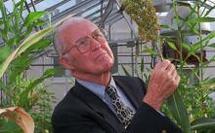Borlaug, father of Green Revolution, dies at 95
Andrew Beatty
WASHINGTON, Andrew Beatty - Norman Borlaug, a Nobel Prize winning scientist whose work on disease-resistant wheat is credited with saving hundreds of millions of lives, has died at the age of 95.
The acclaimed agriculturalist, often called the father of the Green Revolution, died late on Saturday in Dallas, Texas, due to complications from cancer, according to Texas A&M University, where Borlaug served since 1984.

"Norman E. Borlaug saved more lives than any man in human history," said Josette Sheeran, the head of the World Food Program, on Sunday.
"His total devotion to ending famine and hunger revolutionized food security for millions of people and for many nations."
Borlaug began his career before World War II at the US forestry service, after earning an undergraduate degree at the University of Minnesota.
Like many from America's Midwest, Borlaug traced his roots back to Europe's Nordic region, which he referred to as "the land of my fathers."
Born in March 1914, "his childhood days were spent on an Iowa farm, influenced by his Norwegian grandfather's lessons on common sense," Texas A&M University said.
That common sense led him to focus on food, which he saw as both a fundamental element of human existence and a moral right.
"Civilization as it is known today could not have evolved, nor can it survive, without an adequate food supply," he said in his 1970 Nobel Lecture.
"Man can and must prevent the tragedy of famine in the future instead of merely trying with pious regret to salvage the human wreckage."
In 1944 he began working with Mexican scientists to develop new wheat varieties, which were later introduced to India and Pakistan, helping to feed what he described as the "population monster."
According to Borlaug's own figures, the new strain nearly doubled Indian and Pakistani wheat production between 1965 and 1970, a leap of more than 11 million tons.
The success, at a time when mass famines were widely predicted, spread his fame across the globe and his dwarf wheat throughout Latin America, the Middle East and Africa.
He was awarded the Nobel Peace Prize for his work in 1970, when he pledged to serve with "an army of hunger fighters... for a lifetime term."
In the United States he was awarded the Presidential Medal of Freedom and the US Congressional Gold Medal, the country's two top civilian honors.
He was also awarded the Padma Vibhushan, India's second highest honor and a slew of honorary universities degrees from around the world, from Japan to Bolivia.
As biotechnology developed apace with the advent of genetic modification, Borlaug became an avid supporter.
"The public needs to be better informed about the importance of biotechnology in food production so it won't be so critical," he said in a 2002 interview with ActionBioscience.org.
His wife Margaret passed away in 2007. He was the father of two children.
----------------------------------------------------------------------------------------------------------------------------------